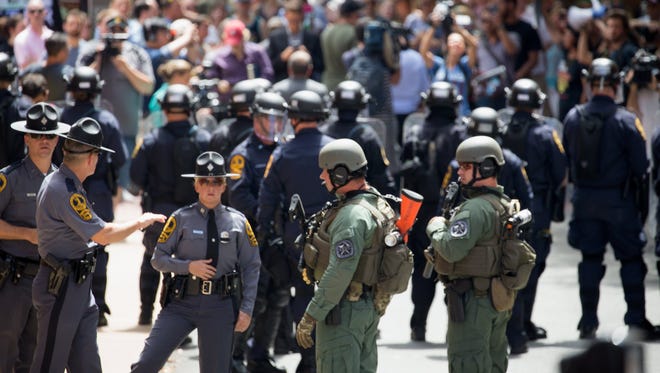Police must act fast to protect First Amendment rights: Robert Shibley
The deliberate decision by local and campus leaders to let violence start serves the interests of those who would squelch debate.

Americans were shocked by the naked political violence we saw this weekend in Charlottesville, Va. Commenters on the left and the right immediately blamed the usual suspects. The right blamed identity politics. The left blamed entrenched racism. But an obvious cause of injury and death is once again being overlooked: the fact that the violence was allowed to get underway at all.
State, local, and even college campus leadership appear to be telling police to stand by while some degree of unlawful violence takes place right before their eyes. Yet when that violence predictably spirals out of control, the authorities profess their inability to have done anything to stop it. Meanwhile, those inclined to violence are emboldened, secure in the knowledge that the publicity payoff is high and the odds of punishment low.
More:Three homeland security lessons from Charlottesville: Michael Chertoff
More:Trump Tower presser proved our president is far worse than a racist
This must stop. Freedom of expression is what gives us the ability to hash out societal issues through argument instead of physical conflict, but it is only meaningful when people are reasonably confident that they will be physically safe while they speak and listen. When the authorities simply stand by and let political violence occur, even in the hope of the conflict somehow “de-escalating” itself, they send the message that both sides have a free hand to violently attack their opponents. This makes a mockery of the First Amendment rights to free speech and assembly.
After the riot that successfully prevented Milo Yiannopoulos from speaking at the University of California, Berkeley, in February, many reported on the conspicuous lack of police involvement despite the injuries and destruction. I personally spoke to a woman who had come to see the speech. Having been pepper-sprayed and nearly blinded by a violent protester, she told me she crawled over three layers of crowd barriers to reach a building with dozens of police inside. Yet when she reached the door, the police refused her entry.
Likewise, CNN reported that in Charlottesville, “both sides agree that one group didn't do enough to prevent the violence as the crowds grew and tensions flared: the police.” The organizer of the “Unite the Right” rally complained that “police purposefully created the catastrophe that led to a melee in the streets of Charlottesville,” while a Black Lives Matter leader attending the counter-protest remarked, “It's almost as if they wanted us to fight each other.”
More:Trump champion: Bury Confederate romanticism. It's indefensible and bad for GOP.
POLICING THE USA: A look at race, justice, media
It’s hard to think of a more thankless task than riot policing. But when authorities fail at the basic task of preventing mob violence, both political and policy questions need to be asked. When the Huffington Post reports that “Several times, a group of assault-rifle-toting militia members from New York State … played a more active role in breaking up fights” than the police, law enforcement’s response needs serious rethinking.
There is one group of people who have so far consistently benefitted when political violence has been allowed to take place: the politicians who lead our localities and the de facto politicians who run our campuses. They avoid the political fallout from images of police confronting violent protesters (who may also be their supporters), they get to blame whichever side they like less for causing the violence, and get to pretend to fulfill their responsibility to keep people “safe” by making it harder for controversial viewpoints to be expressed.
Ann Coulter had to cancel a speech at Berkeley after the school insisted it would not be safe for her to speak on campus. Virginia Governor Terry McAuliffe blamed the ACLU of Virginia and a federal judge for blocking the city’s attempt to revoke the rally’s permit, saying “We've got to look at these permits.” This week, Texas A&M and the University of Florida announced that safety concerns prevented them from hosting speeches by Richard Spencer that are several weeks away. In contrast, in the 1960s American Nazi Party founder George Lincoln Rockwell was able to speak at UCLA, Michigan State, Brown, and other colleges, before audiences containing people who might have fought — or lost loved ones to — actual German Nazis. How can it be that hosting a similar speaker is impossible now?
Trading our free speech rights for the opportunity to be victimized by political violence is tremendously foolish, as is turning the blame for it on our civil liberties or those who defend them. Benjamin Franklin famously told a curious Philadelphian that America’s founders had given us “a republic, if you can keep it.” This is exactly what he was talking about.
Robert Shibley, an attorney, is executive director of the Foundation for Individual Rights in Education (FIRE).
You can read diverse opinions from our Board of Contributors and other writers on the Opinion front page, on Twitter @USATOpinion and in our daily Opinion newsletter. To respond to a column, submit a comment to letters@usatoday.com.